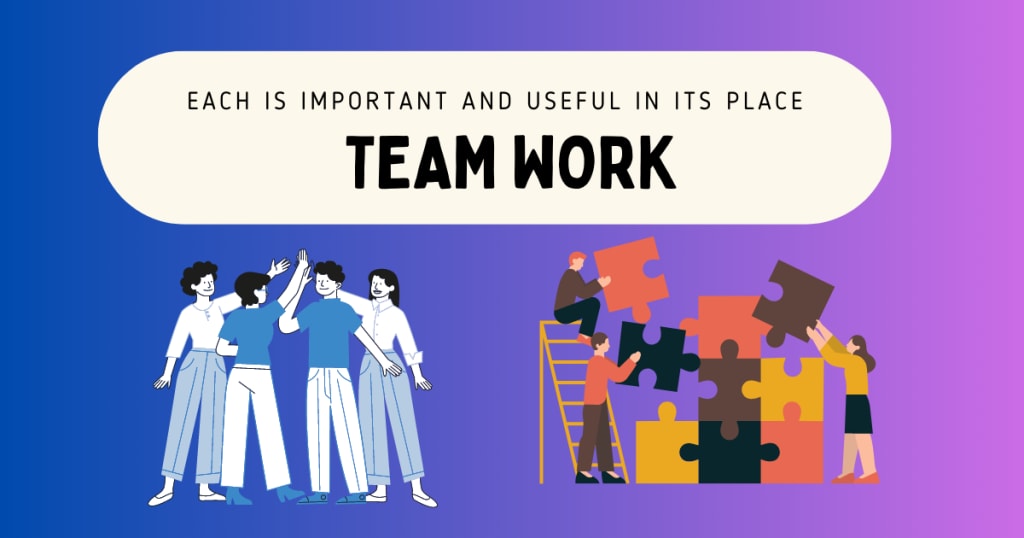The Symphony of Success: Unleashing the Power of Teamwork
Mastering Collaboration and Coordination for Achieving Extraordinary Results

Introduction:
In today's interconnected and rapidly changing world, the ability to work effectively as a team has become essential in almost every aspect of life.
From business projects to sports teams, from community initiatives to creative endeavour's, teamwork plays a vital role in achieving collective goals and unlocking success.
In this article, we will explore the significance of teamwork, delve into the benefits it brings, and provide practical insights on how to coordinate with team members to maximize productivity and foster a harmonious working environment.
So, let's embark on a journey to discover the true power of teamwork and uncover the keys to successful collaboration.
Understanding the Importance of Teamwork:
Teamwork is more than just a buzzword; it is the foundation of successful endeavour's.
We will delve into the reasons why teamwork is essential in various contexts, such as:
Synergy and Enhanced Performance:
When individuals with diverse skills, experiences, and perspectives come together, they can complement each other's strengths and compensate for weaknesses, resulting in increased efficiency and improved performance.
Innovation and Creativity:
Collaboration fosters the exchange of ideas, sparks creativity, and encourages innovative solutions. When team members collaborate and build upon each other's ideas, the possibilities for breakthroughs and novel approaches multiply.
Support and Motivation:
Working as a team provides emotional support, shared responsibility, and a sense of belonging. This support system motivates team members, boosts morale, and helps overcome challenges together.
The Benefits of Effective Team Coordination:
Successful teamwork requires effective coordination among team members.
We will explore key strategies and practices to enhance coordination and maximize team performance, including:
Clear Communication:
Open and transparent communication is the cornerstone of effective coordination.
Team members should establish clear channels of communication, actively listen, and share information promptly to ensure everyone is on the same page.
Defined Roles and Responsibilities:
Clearly defining roles and responsibilities within the team prevents confusion and minimizes duplication of efforts. Each team member should have a clear understanding of their tasks, deliverables, and expectations.
Establishing Goals and Objectives:
Setting specific, measurable, achievable, relevant, and time-bound (SMART) goals helps align the team's efforts and focus. Regularly revisiting and evaluating these goals allows for adjustments and keeps the team on track.
Building Trust and Collaboration:
Trust is the glue that holds a team together. Fostering trust among team members through open communication, mutual respect, and support encourages collaboration, cooperation, and a positive team dynamic.
Effective Conflict Resolution:
Conflict is a natural part of team dynamics, but when managed constructively, it can lead to growth and improved outcomes.
Developing conflict resolution skills, promoting open dialogue, and finding win-win solutions are essential for effective teamwork.
Strategies for Successful Teamwork:
We will explore practical strategies to promote successful teamwork and create a cohesive and high-performing team environment, including:
Encouraging Diversity and Inclusion:
Embracing diversity in terms of skills, backgrounds, perspectives, and experiences fosters creativity, innovation, and a more comprehensive approach to problem-solving.
Establishing a Positive Team Culture:
Nurturing a positive team culture based on trust, respect, open communication, and shared values creates a supportive and inclusive environment where team members feel empowered and motivated.
Promoting Collaboration and Knowledge Sharing:
Encouraging collaboration and knowledge sharing through brainstorming sessions, regular team meetings, and platforms for information exchange fosters a sense of collective ownership and enables continuous learning.
Providing Feedback and Recognition:
Regular feedback and recognition help reinforce positive behaviour's, acknowledge contributions, and provide opportunities for growth and improvement.
Celebrating team achievements and milestones boosts morale and strengthens team cohesion.
Embracing Flexibility and Adaptability:
The ability to adapt to changing circumstances and embrace flexibility is crucial for effective teamwork.
Encouraging an agile mindset and fostering a culture of continuous improvement ensures the team can respond and thrive in dynamic environments.
Conclusion:
Teamwork is a powerful force that propels individuals and organizations towards success.
By recognizing the importance of teamwork, understanding the benefits of effective coordination, and implementing strategies for successful collaboration, teams can unlock their full potential and achieve remarkable results.
Remember, teamwork is not merely the sum of individual efforts; it is the synergy, support, and shared vision that drive excellence.
So, embrace the power of teamwork, harness the collective intelligence of your team, and embark on a journey of collaboration, coordination, and collective success.
About the Creator
Evelyn Taylor
A front-end enthusiast and dedicated development engineer, eager to expand knowledge on development techniques and collaborate with others to build exceptional software solutions.






Comments
There are no comments for this story
Be the first to respond and start the conversation.